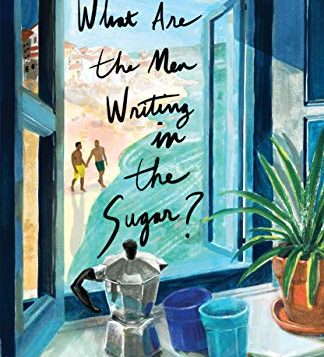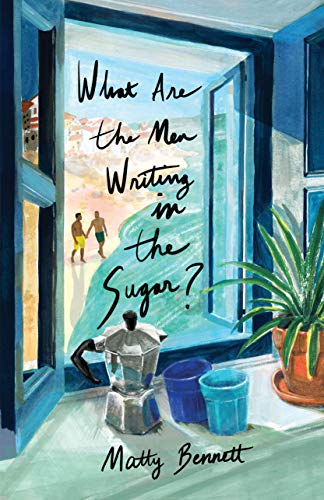IN THIS SWEET debut collection of love poems, What Are the Men Writing in the Sugar?, Matty Bennett puts a first serious gay relationship on a pedestal to admire it from every angle. Bennett, a self-described Millennial, isn’t reflecting on a relationship that happened long ago, but reporting on one in real time (at least two of the poems seem to have made their debuts on Instagram). “We have woken up 10,000 times./ I have inspected your neck just a few hundred,” Bennett writes in “Display of Affection.” What the poems lack in the wisdom of experience they compensate for in immediacy and giddiness of feeling. This is a poet who values love, who is in love, and who wants to be in love even when he isn’t. (At the outset of an earlier relationship, he describes his plans to write a poem after every date; the third one is titled “Breakup.”)
Moving in together, the young men play house. Suddenly the kind of cup they drink from matters hugely, and they run around Italy on vacation looking for the same rainbow-colored espresso cups that the speaker’s boyfriend’s mother has in her cluttered, cheerful kitchen. As a way to get closer to his boyfriend, the speaker learns Italian on the Duolingo app, sprinkling charmingly useless phrases into his conversation—and into the poems. The collection’s title is a play on one of them. In that poem, self-awareness pierces the heart like an arrow: “My first instinct is to write/ my name in cursive and draw/ a heart: how can you change/ an instinct?” This instinct he describes may say something too, about how he experiences being gay. Both feelings seem inborn. Throughout the collection, details are closely observed. Bodies appear up close and in fragments the way they do in bed: elbows, naked backs, and, most frequently, hands. Powerful images economically convey revealing details about both character and place, such as the speaker’s boyfriend’s black shoes standing near the door in the puddles they make from the snow. “Impression, Visibility,” one of the few poems to turn the adoring gaze inward, traces two lineages: those of the speaker’s family and those of gay men (“a heritage I knew nothing/ about”). It debunks dreams of romance and lofty ideas about community. After leaving home and coming out, he confesses deep-seated feelings about the way he hoped the world worked: “I thought leaving would/ somehow make me feel seen. I thought/ I would feel at home. I thought there would be/ someone in bed next to me in the morning.” There’s something sad and grown-up about this, as if the heart-shaped scales have fallen from his eyes. The powerful repetition of that “I thought” beats like a heart. This whole collection throbs with feeling: not just with what Bennett has experienced, but with what he wants to experience—the all-consuming intensity of his desire. The collection is a moving valentine to young love, and young ideas about love, and a kind of longing that is uniquely, specifically gay. ____________________________________________________






